Exposť Archive - Issue #1
Reviews: New and Recent Releases
Iconoclasta - "La Rencarnacion de Maquiavelo"
(private release, 1992, CD)
This is the recent release from Mexico's premiere band. However my first question, after noting that the band is now ten years old, was, "Have they sold out yet?" Seems like all the best do eventually. I'm happy to say that La Rencarnacion de Maquiavelo is not musically compromising at all. They may have lost a bit of an edge over the years, but not enough to warrant any complaints. In fact, this release is very much in the same style of the rest of their albums. That is where I have a problem. While Iconoclasta remains one of the best instrumental ensembles recording today, their style is no longer fresh. When they released their debut in 1983, in was an innovative, adventurous and unique departure from the dominant sound of the time. In 1992 they sound largely the same. While this is better than a commercial sell-out, it is still stagnation. But La Rencarnacion is a very good CD to add to your collection and I recommend it, especially if you've heard and enjoyed earlier Iconoclasta releases. Overall, I give it a thumbs up. - Mike Borella
Ozric Tentacles - "Jurassic Shift"
(Dove 6, 1993, LP/CD)
First opinion was certainly a "Wow" as it seems like Ozric have returned to what they do best as typified on "Erpland". But this album is TOO much like "Erpland" to the point that songs like "Vita Voom" are almost direct rehashes of songs like "Tidal Convergence." I can't help but like the album, but it certainly isn't original or groundbreaking to any extent. But being the manic Ozric fan that I am, I'd rather have them redo "Erpland" than "Strangeitude" and I'll go ahead and enjoy it anyway. Cool cover as well (I heard the LP.). - Mike Mclatchey
-
Magma - "Les Voix"
(AKT I, 1992, CD)
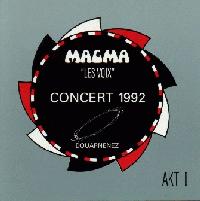 Magma's Christian Vander has decided to follow in the footsteps of Frank Zappa, Andy Latimer, and others in an effort to fight the bootleggers, and has started his own record label AKT to release live shows and other special material from his own personal archives. Les Voix is the first release on this label, recorded at the Douarnenez concert, August 2, 1992. The lineup at this point featured Christian (vocals, piano & drums), Simon Goubert (piano, keys), Pierre Michel Sivadier (keys), Philippe Dardelle (contrabass), and in keeping with the title ("The Voices"), Stella Vander and seven other vocalists grace this show with a constant flow of high energy choral work. As might be expected from this mostly acoustic lineup, the musical style here is more in keeping with the recent offering albums than the early Magma of the 70's; drums are used only sparingly. The album's four tracks include three from the vintage years: 'Emehnteht Re', 'Zess' and a sixteen minute version of 'Wurdah Itah'; in each case the chorus has been used to implement the parts originally done by guitars and synthesizer. The end result is nothing short of stunning. The recording quality is superb, it's easy to forget this is a live one! - Peter Thelen
Magma's Christian Vander has decided to follow in the footsteps of Frank Zappa, Andy Latimer, and others in an effort to fight the bootleggers, and has started his own record label AKT to release live shows and other special material from his own personal archives. Les Voix is the first release on this label, recorded at the Douarnenez concert, August 2, 1992. The lineup at this point featured Christian (vocals, piano & drums), Simon Goubert (piano, keys), Pierre Michel Sivadier (keys), Philippe Dardelle (contrabass), and in keeping with the title ("The Voices"), Stella Vander and seven other vocalists grace this show with a constant flow of high energy choral work. As might be expected from this mostly acoustic lineup, the musical style here is more in keeping with the recent offering albums than the early Magma of the 70's; drums are used only sparingly. The album's four tracks include three from the vintage years: 'Emehnteht Re', 'Zess' and a sixteen minute version of 'Wurdah Itah'; in each case the chorus has been used to implement the parts originally done by guitars and synthesizer. The end result is nothing short of stunning. The recording quality is superb, it's easy to forget this is a live one! - Peter Thelen
Kalaban - "Resistance is Useless"
(Syn-Phonic SYNCD 11, 1993, CD)
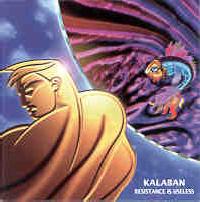 The long-awaited second release by this Utah based five piece is well worth the waiting; they have produced an outstanding album that is at once very forward looking, while also being reasonably accessible - and a major step forward from their 1990 release "Don't Panic". The key to Kalaban's sound lies primarily in the dynamics between keys man Michael Stout and guitarist Randy Graves, with strong and precise backing from the rhythm section. The sound travels between heavy, spacy and moody segments, well arranged and full of energy and atmosphere, into freewheeling jams that border on edgy, approaching Djam Karet in their high energy mode. Only two of the album's five tracks feature vocalist David Thomas, who offers the perspective of accessibility, but even at that, these two numbers are first and foremost instrumental tracks. In summary, this is an album that must be heard to be appreciated, and definitely shows that Kalaban are major players in the progressive scene today. - Peter Thelen
The long-awaited second release by this Utah based five piece is well worth the waiting; they have produced an outstanding album that is at once very forward looking, while also being reasonably accessible - and a major step forward from their 1990 release "Don't Panic". The key to Kalaban's sound lies primarily in the dynamics between keys man Michael Stout and guitarist Randy Graves, with strong and precise backing from the rhythm section. The sound travels between heavy, spacy and moody segments, well arranged and full of energy and atmosphere, into freewheeling jams that border on edgy, approaching Djam Karet in their high energy mode. Only two of the album's five tracks feature vocalist David Thomas, who offers the perspective of accessibility, but even at that, these two numbers are first and foremost instrumental tracks. In summary, this is an album that must be heard to be appreciated, and definitely shows that Kalaban are major players in the progressive scene today. - Peter Thelen
Cathedral - "Kingdom Of Ends"
(Kinesis KDCD 1005, 1993, CD)
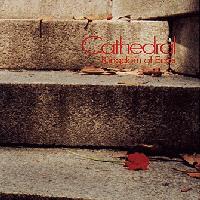 "Kingdom Of Ends" is the first CD by the Washington DC based five-piece Cathedral. Their sound is firmly in the neo-progressive camp, perhaps more radio-ready than most. Their sound blends tried and true progressivisms into an accessible format, fronted by lead vocalist Ted Thompson, while still offering plenty of instrumental fire and spirited solos. At times they may remind of Pendragon in earlier years, but such a comparison only accounts for an overall sound, and doesn't factor in Cathedral's superior compositional skills; their instrumental passages deliver far more eloquent and provocative moments than the aforementioned - and nowhere is this more evident than the instrumental break in "Psychotic". Yet they still show a good pop sensibility with tracks like "So far From Home", which seems to have all the makings of a successful pop track without the sugar coating. These guys show a lot of promise, and fans of the neo-progressive sound will surely enjoy this album beginning to end. - Peter Thelen
"Kingdom Of Ends" is the first CD by the Washington DC based five-piece Cathedral. Their sound is firmly in the neo-progressive camp, perhaps more radio-ready than most. Their sound blends tried and true progressivisms into an accessible format, fronted by lead vocalist Ted Thompson, while still offering plenty of instrumental fire and spirited solos. At times they may remind of Pendragon in earlier years, but such a comparison only accounts for an overall sound, and doesn't factor in Cathedral's superior compositional skills; their instrumental passages deliver far more eloquent and provocative moments than the aforementioned - and nowhere is this more evident than the instrumental break in "Psychotic". Yet they still show a good pop sensibility with tracks like "So far From Home", which seems to have all the makings of a successful pop track without the sugar coating. These guys show a lot of promise, and fans of the neo-progressive sound will surely enjoy this album beginning to end. - Peter Thelen
Providence - "Rare Tracks"
(Made In Japan MCB-002, 1993, CD)
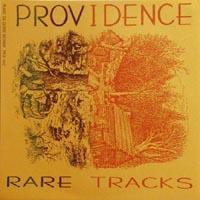 In their brief career, Providence only released one album, "...And I'll Recite An Old Myth From", and graced al least one of MIJ's sampler discs. Their sound is a powerful neo-progressive blending brilliant melodics, high energy delivery and lengthy well crafted compositions, with vocalist Yoko Kubota tying it all together. "Rare Tracks" is a collection of outtakes, rare live tracks, and so on, that apparently pre-date their 1990 album; these tracks tend to show more of an overt Crimsoid influence than might be hinted at on their album, and offer a different perspective of the band. While the performance, as might be expected, is outstanding, it should be noted that the sound is bootleg quality. - Peter Thelen
In their brief career, Providence only released one album, "...And I'll Recite An Old Myth From", and graced al least one of MIJ's sampler discs. Their sound is a powerful neo-progressive blending brilliant melodics, high energy delivery and lengthy well crafted compositions, with vocalist Yoko Kubota tying it all together. "Rare Tracks" is a collection of outtakes, rare live tracks, and so on, that apparently pre-date their 1990 album; these tracks tend to show more of an overt Crimsoid influence than might be hinted at on their album, and offer a different perspective of the band. While the performance, as might be expected, is outstanding, it should be noted that the sound is bootleg quality. - Peter Thelen
Dogma - "Album"
(Progressive Rock Worldwide PRW 006, 1992, CD)
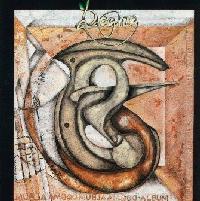 In my opinion, this is what a neo-progressive album should sound like. Dogma's debut is an excellent album, very much in the instrumental style that Pendragon started on with the second part of "Alaska" from "The Jewel." No vocals here (an idea that I wish Pendragon would have gone with) but long lush tracks of excellent melodic music in the neo-progressive vein, but with two exceptions - Dogma are original, and are not commercially biased. Certainly the best new Brazilian band since Quaterna Requiem. And don't forget that Marcus Viana of Sagrado Coracoa De Terra also adds some violin to a track. - Mike Mclatchey
In my opinion, this is what a neo-progressive album should sound like. Dogma's debut is an excellent album, very much in the instrumental style that Pendragon started on with the second part of "Alaska" from "The Jewel." No vocals here (an idea that I wish Pendragon would have gone with) but long lush tracks of excellent melodic music in the neo-progressive vein, but with two exceptions - Dogma are original, and are not commercially biased. Certainly the best new Brazilian band since Quaterna Requiem. And don't forget that Marcus Viana of Sagrado Coracoa De Terra also adds some violin to a track. - Mike Mclatchey
Thierry Zaboitzeff - "Dr.Zab & His Robotic Strings Orchestra"
(Mantra 074, 1992, CD)
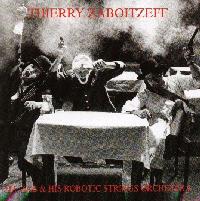 Zaboitzeff is the Bass Guitarist/Cellist for Art Zoyd. This solo project shows him in a more electronic setting, as it is done mostly using synths and sequencers. There are 22 tracks of varying length and styles, but firmly in the neo-classical/electronic style. The album is brilliant, and strikes a good balance between melodics and dark Zoydian textures; It's one that tends to grow on the listener, but not one that will alienate on the first listen; in fact this album is sufficiently accessible that even folks who've had problems adapting to the dark and angular worlds of bands like Art Zoyd and Univers Zero should have no problem with this. - Peter Thelen
Zaboitzeff is the Bass Guitarist/Cellist for Art Zoyd. This solo project shows him in a more electronic setting, as it is done mostly using synths and sequencers. There are 22 tracks of varying length and styles, but firmly in the neo-classical/electronic style. The album is brilliant, and strikes a good balance between melodics and dark Zoydian textures; It's one that tends to grow on the listener, but not one that will alienate on the first listen; in fact this album is sufficiently accessible that even folks who've had problems adapting to the dark and angular worlds of bands like Art Zoyd and Univers Zero should have no problem with this. - Peter Thelen
Marc Ceccotti - "M.A.S.C."
(Mellow MMP 144, 1993, CD)
I heard that this was the new Edhels album all the way up to the time that I got it. Anyway, Ceccotti was more or less the brains behind Edhels, and his first solo album is definitely in the vein of "Astro-Logical". The music of Ceccotti has definitely moved into the techno electronic stuff, but it is on this album that Cecotti seems to have saved his best guitar licks for. Quite good, if you weren't disappoined with "Astro-Logical" you should like this one. - Mike Mclatchey
Ain Soph - "5 Evolved From 9"
(Made In Japan MCD 2925, 1993, CD)
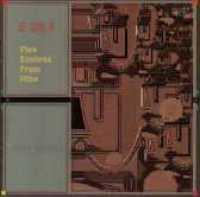 This Japanese band has been around for a while and has put out some pretty damn good music. Unabashedly Canterbury influenced, (Album titles: Hat & Field, Ride On A Camel) it seems that Ain Soph are trying to break away from that into a more original style. Their new album is quite excellent, and much more jazzy than you'd expect and seems a bit more like "A Story From Mysterious Forest" than the last one "Marine Menagerie." Make what you will of that! Great music and it seems that the Japanese are catching up with bands such as Il Berlione and Ain Soph in the original progressive music scene. - Mike Mclatchey
This Japanese band has been around for a while and has put out some pretty damn good music. Unabashedly Canterbury influenced, (Album titles: Hat & Field, Ride On A Camel) it seems that Ain Soph are trying to break away from that into a more original style. Their new album is quite excellent, and much more jazzy than you'd expect and seems a bit more like "A Story From Mysterious Forest" than the last one "Marine Menagerie." Make what you will of that! Great music and it seems that the Japanese are catching up with bands such as Il Berlione and Ain Soph in the original progressive music scene. - Mike Mclatchey
Asgard - "Arkana"
(Music Is Intelligence WMMS-018, 1992, CD)
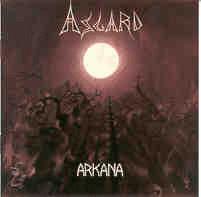 Arkana is the latest offering from the Italian neo-progressive band Asgard. Their sound is full of power and grandeur, very symphonic, with affected vocals, shifting moods and almost schizophrenic dynamic changes. Overall, their material is full of feeling and emotion, oftimes ethereal, yet very directed and always dark (although I haven't really sat down and given the lyrics close scrutiny). Lyrics are in English. The vocalist is nothing short of exceptional, and the rest of the band supports him well, rather than burying him. The extended instrumental passages show a band capable of producing raw power, melodic cohesion, and subtle restraint when needed. Comparisons? Sometimes I hear echoes of some great 70's Italian bands like PFM, Raccomandata RR, Island, and others, yet the vocalist reminds a little of Aragon, Galadriel or Mugen, sort of gothic, but to be fair, these guys are pretty unique. Anyway, for those who may be familiar with Asgard's two previous releases (Gotterdamerung from 1991 and Esoteric Poem from 1992), this newest release shows the band expanding out into some new musical territory, breaking new ground at every twist and turn in the album's 74 minutes. I believe this to be their best yet, by far. - Peter Thelen
Arkana is the latest offering from the Italian neo-progressive band Asgard. Their sound is full of power and grandeur, very symphonic, with affected vocals, shifting moods and almost schizophrenic dynamic changes. Overall, their material is full of feeling and emotion, oftimes ethereal, yet very directed and always dark (although I haven't really sat down and given the lyrics close scrutiny). Lyrics are in English. The vocalist is nothing short of exceptional, and the rest of the band supports him well, rather than burying him. The extended instrumental passages show a band capable of producing raw power, melodic cohesion, and subtle restraint when needed. Comparisons? Sometimes I hear echoes of some great 70's Italian bands like PFM, Raccomandata RR, Island, and others, yet the vocalist reminds a little of Aragon, Galadriel or Mugen, sort of gothic, but to be fair, these guys are pretty unique. Anyway, for those who may be familiar with Asgard's two previous releases (Gotterdamerung from 1991 and Esoteric Poem from 1992), this newest release shows the band expanding out into some new musical territory, breaking new ground at every twist and turn in the album's 74 minutes. I believe this to be their best yet, by far. - Peter Thelen
Cro-Magnon - "Zapp"
(Het Verkeere Been 9201, 1992, CD)
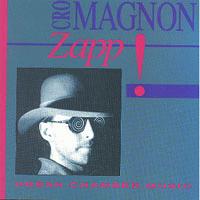 An interesting newcomer in the 'Chamber Music Rock' subgenre, this is a Belgian five piece featuring a lineup of dual violins, keyboards, alto and baritone saxes and bass. Naturally, as might be expected, their sound draws heavily on classical, and lightly on jazz, folk, and rock themes. They are essentially drummerless, but still rhythmically very powerful - although on a few tracks (most notably "Kongo") there are drums/percussion (..but no credits are given - could be sampled). Their music is entirely instrumental. Their basic sound could be likened to Art Zoyd meets Miriodor meets PCO, they share much in common with these bands - The melodious sax-driven and angular approach of Miriodor, the warm romanticism of Penguin Cafe, and the stark, foreboding chamber-music stylings of Zoyd, but in the end they sound more like none of these, being truly a case where the whole is much greater than the sum of any of the element parts. All in all, an outstanding release, hopefully the first of many. - Peter Thelen
An interesting newcomer in the 'Chamber Music Rock' subgenre, this is a Belgian five piece featuring a lineup of dual violins, keyboards, alto and baritone saxes and bass. Naturally, as might be expected, their sound draws heavily on classical, and lightly on jazz, folk, and rock themes. They are essentially drummerless, but still rhythmically very powerful - although on a few tracks (most notably "Kongo") there are drums/percussion (..but no credits are given - could be sampled). Their music is entirely instrumental. Their basic sound could be likened to Art Zoyd meets Miriodor meets PCO, they share much in common with these bands - The melodious sax-driven and angular approach of Miriodor, the warm romanticism of Penguin Cafe, and the stark, foreboding chamber-music stylings of Zoyd, but in the end they sound more like none of these, being truly a case where the whole is much greater than the sum of any of the element parts. All in all, an outstanding release, hopefully the first of many. - Peter Thelen
Il Berlione - "Il Berlione"
(Belle Antique 9229, 1992, CD)
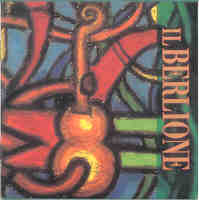 No, this is not another lost 70's Italian reissue, but instead a powerful new Japanese quintet featureing guitar, bass, saxes, keys and drums. Their sound could best be described as a canterbury/RIO influenced rock with a healthy dose of mid-period King Crimson. There are strong jazz elements, comparable to the Hopper/Dean period of Soft Machine, and the angularity and moodiness of Univers Zero. Guitarist Naoya Idonuma dominates many of the tracks with his ever finger-blistering leads, playing in a multitude of textures, reminding at times of Beck, Fripp, even Zappa and Santana, but the similarities are more event driven than any sort of conscious emulation, fitting a style to the moment. Hiroo Takano (saxes) generally works in close conjunction with Naoya, but does split off from time to time for some eloquent solos. More than anything else, it is his saxes and the restless rhythm section that connects their sound to the Canterbury/RIO style. Keyboardist Hirofumi Taniguchi maintains All taken, this is one excellent album, especially considering it's their first! Fans of Soft Machine, Crimson, National Health and Henry Cow will most certainly enjoy this one. - Peter Thelen
No, this is not another lost 70's Italian reissue, but instead a powerful new Japanese quintet featureing guitar, bass, saxes, keys and drums. Their sound could best be described as a canterbury/RIO influenced rock with a healthy dose of mid-period King Crimson. There are strong jazz elements, comparable to the Hopper/Dean period of Soft Machine, and the angularity and moodiness of Univers Zero. Guitarist Naoya Idonuma dominates many of the tracks with his ever finger-blistering leads, playing in a multitude of textures, reminding at times of Beck, Fripp, even Zappa and Santana, but the similarities are more event driven than any sort of conscious emulation, fitting a style to the moment. Hiroo Takano (saxes) generally works in close conjunction with Naoya, but does split off from time to time for some eloquent solos. More than anything else, it is his saxes and the restless rhythm section that connects their sound to the Canterbury/RIO style. Keyboardist Hirofumi Taniguchi maintains All taken, this is one excellent album, especially considering it's their first! Fans of Soft Machine, Crimson, National Health and Henry Cow will most certainly enjoy this one. - Peter Thelen
Adrian Marcator - "Eiderland Suite"
(Trans Form TR34, 1992, CD)
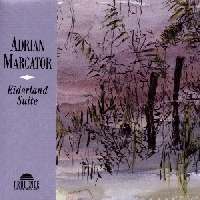 Eiderland is strongly rooted in German traditional folk music stylings, although all of it's twenty tracks are original material. In summary it could be said by comparison, that Eiderland is to German folk music what the first couple of Horslips albums were to Irish folk music: A modern refinement and instrumental approach to a style steeped in traditions. The songs vary in scope from very traditional approaches with beautiful melodies, waltzes, marches and tangos, to more upbeat fast-paced numbers, often with outbursts of blistering lead guitar and liberal use of synth, giving some of the tunes an almost electronic feel (case in point typified by "Eiderzeiten", the albums longest track at fourteen minutes). Overall, the music here is very tame and tempered, well thought out and carefully arranged, with little room for raw experimentation. I guess my only genuine complaint is the drum computer/syndrums, which if substituted with real drums and percussion would have made this album much better overall. Still, this unique album is a warm and rich experience that grows on the listener. - Peter Thelen
Eiderland is strongly rooted in German traditional folk music stylings, although all of it's twenty tracks are original material. In summary it could be said by comparison, that Eiderland is to German folk music what the first couple of Horslips albums were to Irish folk music: A modern refinement and instrumental approach to a style steeped in traditions. The songs vary in scope from very traditional approaches with beautiful melodies, waltzes, marches and tangos, to more upbeat fast-paced numbers, often with outbursts of blistering lead guitar and liberal use of synth, giving some of the tunes an almost electronic feel (case in point typified by "Eiderzeiten", the albums longest track at fourteen minutes). Overall, the music here is very tame and tempered, well thought out and carefully arranged, with little room for raw experimentation. I guess my only genuine complaint is the drum computer/syndrums, which if substituted with real drums and percussion would have made this album much better overall. Still, this unique album is a warm and rich experience that grows on the listener. - Peter Thelen
Minimum Vital - "La Source"
(Musea FGBG 4075AR, 1993, CD)
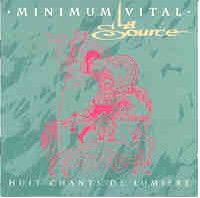 On this, their fourth outing in nine years, les freres Payssan and company continue moving boldly into new territory, while retaining the essence of the sound that makes them unique among modern French bands - offering some oblique references to the neo-canterbury styles of Camel, Happy the Man and Sky, yet sounding like none of the aforementioned, developing those elements and attributes that set them apart from their contemporaries. The subtitle "Huit Chants De Lumiere" should offer a clue: in addition to further refinements in their basic sound, they have given it new life with the inclusion of vocals on every track, although they remain primarily an instrumentally-oriented band. As always, the sound is dominated by Jean-Luc's ripping guitars and the colorful keyboard pyrotechnics of brother Thierry. Bassist Eric Rebeyrol and Drummer Christophe Godet seem a bit more animated this time out and are offering more punch to the arrangements, as evidenced in the highly charged "Tabou", nine minutes of pure brilliance. Another track of special note is the acoustic guitar-driven "Les Mondes De Miranda", with it's strong folk spirit, jazz and classical influences, energized guitar and accordion solos - this is quite possibly the album's strongest cut. The only fault I find in "La Source" is that one or two of the tracks seem a bit more lengthy than they need to be with extra and unnecessary repetition, but this is a relatively minor flaw. Overall this is an exceptional album by one France's most unique bands. - Peter Thelen
On this, their fourth outing in nine years, les freres Payssan and company continue moving boldly into new territory, while retaining the essence of the sound that makes them unique among modern French bands - offering some oblique references to the neo-canterbury styles of Camel, Happy the Man and Sky, yet sounding like none of the aforementioned, developing those elements and attributes that set them apart from their contemporaries. The subtitle "Huit Chants De Lumiere" should offer a clue: in addition to further refinements in their basic sound, they have given it new life with the inclusion of vocals on every track, although they remain primarily an instrumentally-oriented band. As always, the sound is dominated by Jean-Luc's ripping guitars and the colorful keyboard pyrotechnics of brother Thierry. Bassist Eric Rebeyrol and Drummer Christophe Godet seem a bit more animated this time out and are offering more punch to the arrangements, as evidenced in the highly charged "Tabou", nine minutes of pure brilliance. Another track of special note is the acoustic guitar-driven "Les Mondes De Miranda", with it's strong folk spirit, jazz and classical influences, energized guitar and accordion solos - this is quite possibly the album's strongest cut. The only fault I find in "La Source" is that one or two of the tracks seem a bit more lengthy than they need to be with extra and unnecessary repetition, but this is a relatively minor flaw. Overall this is an exceptional album by one France's most unique bands. - Peter Thelen
Montefeltro - "Il Tiempo Di Far La Fantasia"
(Musea FGBG 4072AR, 1993, CD)
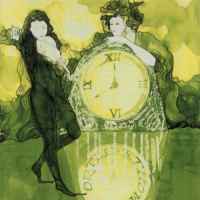 Montefeltro is essentially the duo of Piergiorgio Ambrosi (keyboards) and Attilio Virgilio (guitars & vocals), with guest musicians rounding the sound out on bass and drums. Their approach is rooted in folk and progressive rock, principally with melodics, dynamics, and simplicity. The music tends to be delicate, atmospheric, and pastoral at times, not agressive. The vocals are very good although on a couple tracks the vocal arrangements seem pedestrian; lyrics are in italian, and overall the vocals take a back seat to extended instrumental arrangements. For those who need comparisons, Montefeltro might be thought of in terms of two other contemporary Italian bands: Eris Pluvia and Arcansiel, with some added grand symphonics and early-PFM style acoustic textures. Occasionally they sound a little neo-progressive, especially when songs get loud with the sidemen involved (hence the Arcansiel comparison); Montefeltro's most brilliant moments are the quiet and ethereal ones, when the keyboards and acoustic guitars dominate the mix, like on the 22 minute opening track "Canto No.1". In summary, this is a strong album from a band that, like Asgard and Galadriel, is a sure bet to improve with age. - Peter Thelen
Montefeltro is essentially the duo of Piergiorgio Ambrosi (keyboards) and Attilio Virgilio (guitars & vocals), with guest musicians rounding the sound out on bass and drums. Their approach is rooted in folk and progressive rock, principally with melodics, dynamics, and simplicity. The music tends to be delicate, atmospheric, and pastoral at times, not agressive. The vocals are very good although on a couple tracks the vocal arrangements seem pedestrian; lyrics are in italian, and overall the vocals take a back seat to extended instrumental arrangements. For those who need comparisons, Montefeltro might be thought of in terms of two other contemporary Italian bands: Eris Pluvia and Arcansiel, with some added grand symphonics and early-PFM style acoustic textures. Occasionally they sound a little neo-progressive, especially when songs get loud with the sidemen involved (hence the Arcansiel comparison); Montefeltro's most brilliant moments are the quiet and ethereal ones, when the keyboards and acoustic guitars dominate the mix, like on the 22 minute opening track "Canto No.1". In summary, this is a strong album from a band that, like Asgard and Galadriel, is a sure bet to improve with age. - Peter Thelen
 Magma's Christian Vander has decided to follow in the footsteps of Frank Zappa, Andy Latimer, and others in an effort to fight the bootleggers, and has started his own record label AKT to release live shows and other special material from his own personal archives. Les Voix is the first release on this label, recorded at the Douarnenez concert, August 2, 1992. The lineup at this point featured Christian (vocals, piano & drums), Simon Goubert (piano, keys), Pierre Michel Sivadier (keys), Philippe Dardelle (contrabass), and in keeping with the title ("The Voices"), Stella Vander and seven other vocalists grace this show with a constant flow of high energy choral work. As might be expected from this mostly acoustic lineup, the musical style here is more in keeping with the recent offering albums than the early Magma of the 70's; drums are used only sparingly. The album's four tracks include three from the vintage years: 'Emehnteht Re', 'Zess' and a sixteen minute version of 'Wurdah Itah'; in each case the chorus has been used to implement the parts originally done by guitars and synthesizer. The end result is nothing short of stunning. The recording quality is superb, it's easy to forget this is a live one! - Peter Thelen
Magma's Christian Vander has decided to follow in the footsteps of Frank Zappa, Andy Latimer, and others in an effort to fight the bootleggers, and has started his own record label AKT to release live shows and other special material from his own personal archives. Les Voix is the first release on this label, recorded at the Douarnenez concert, August 2, 1992. The lineup at this point featured Christian (vocals, piano & drums), Simon Goubert (piano, keys), Pierre Michel Sivadier (keys), Philippe Dardelle (contrabass), and in keeping with the title ("The Voices"), Stella Vander and seven other vocalists grace this show with a constant flow of high energy choral work. As might be expected from this mostly acoustic lineup, the musical style here is more in keeping with the recent offering albums than the early Magma of the 70's; drums are used only sparingly. The album's four tracks include three from the vintage years: 'Emehnteht Re', 'Zess' and a sixteen minute version of 'Wurdah Itah'; in each case the chorus has been used to implement the parts originally done by guitars and synthesizer. The end result is nothing short of stunning. The recording quality is superb, it's easy to forget this is a live one! - Peter Thelen The long-awaited second release by this Utah based five piece is well worth the waiting; they have produced an outstanding album that is at once very forward looking, while also being reasonably accessible - and a major step forward from their 1990 release "Don't Panic". The key to Kalaban's sound lies primarily in the dynamics between keys man Michael Stout and guitarist Randy Graves, with strong and precise backing from the rhythm section. The sound travels between heavy, spacy and moody segments, well arranged and full of energy and atmosphere, into freewheeling jams that border on edgy, approaching Djam Karet in their high energy mode. Only two of the album's five tracks feature vocalist David Thomas, who offers the perspective of accessibility, but even at that, these two numbers are first and foremost instrumental tracks. In summary, this is an album that must be heard to be appreciated, and definitely shows that Kalaban are major players in the progressive scene today. - Peter Thelen
The long-awaited second release by this Utah based five piece is well worth the waiting; they have produced an outstanding album that is at once very forward looking, while also being reasonably accessible - and a major step forward from their 1990 release "Don't Panic". The key to Kalaban's sound lies primarily in the dynamics between keys man Michael Stout and guitarist Randy Graves, with strong and precise backing from the rhythm section. The sound travels between heavy, spacy and moody segments, well arranged and full of energy and atmosphere, into freewheeling jams that border on edgy, approaching Djam Karet in their high energy mode. Only two of the album's five tracks feature vocalist David Thomas, who offers the perspective of accessibility, but even at that, these two numbers are first and foremost instrumental tracks. In summary, this is an album that must be heard to be appreciated, and definitely shows that Kalaban are major players in the progressive scene today. - Peter Thelen "Kingdom Of Ends" is the first CD by the Washington DC based five-piece Cathedral. Their sound is firmly in the neo-progressive camp, perhaps more radio-ready than most. Their sound blends tried and true progressivisms into an accessible format, fronted by lead vocalist Ted Thompson, while still offering plenty of instrumental fire and spirited solos. At times they may remind of Pendragon in earlier years, but such a comparison only accounts for an overall sound, and doesn't factor in Cathedral's superior compositional skills; their instrumental passages deliver far more eloquent and provocative moments than the aforementioned - and nowhere is this more evident than the instrumental break in "Psychotic". Yet they still show a good pop sensibility with tracks like "So far From Home", which seems to have all the makings of a successful pop track without the sugar coating. These guys show a lot of promise, and fans of the neo-progressive sound will surely enjoy this album beginning to end. - Peter Thelen
"Kingdom Of Ends" is the first CD by the Washington DC based five-piece Cathedral. Their sound is firmly in the neo-progressive camp, perhaps more radio-ready than most. Their sound blends tried and true progressivisms into an accessible format, fronted by lead vocalist Ted Thompson, while still offering plenty of instrumental fire and spirited solos. At times they may remind of Pendragon in earlier years, but such a comparison only accounts for an overall sound, and doesn't factor in Cathedral's superior compositional skills; their instrumental passages deliver far more eloquent and provocative moments than the aforementioned - and nowhere is this more evident than the instrumental break in "Psychotic". Yet they still show a good pop sensibility with tracks like "So far From Home", which seems to have all the makings of a successful pop track without the sugar coating. These guys show a lot of promise, and fans of the neo-progressive sound will surely enjoy this album beginning to end. - Peter Thelen In their brief career, Providence only released one album, "...And I'll Recite An Old Myth From", and graced al least one of MIJ's sampler discs. Their sound is a powerful neo-progressive blending brilliant melodics, high energy delivery and lengthy well crafted compositions, with vocalist Yoko Kubota tying it all together. "Rare Tracks" is a collection of outtakes, rare live tracks, and so on, that apparently pre-date their 1990 album; these tracks tend to show more of an overt Crimsoid influence than might be hinted at on their album, and offer a different perspective of the band. While the performance, as might be expected, is outstanding, it should be noted that the sound is bootleg quality. - Peter Thelen
In their brief career, Providence only released one album, "...And I'll Recite An Old Myth From", and graced al least one of MIJ's sampler discs. Their sound is a powerful neo-progressive blending brilliant melodics, high energy delivery and lengthy well crafted compositions, with vocalist Yoko Kubota tying it all together. "Rare Tracks" is a collection of outtakes, rare live tracks, and so on, that apparently pre-date their 1990 album; these tracks tend to show more of an overt Crimsoid influence than might be hinted at on their album, and offer a different perspective of the band. While the performance, as might be expected, is outstanding, it should be noted that the sound is bootleg quality. - Peter Thelen In my opinion, this is what a neo-progressive album should sound like. Dogma's debut is an excellent album, very much in the instrumental style that Pendragon started on with the second part of "Alaska" from "The Jewel." No vocals here (an idea that I wish Pendragon would have gone with) but long lush tracks of excellent melodic music in the neo-progressive vein, but with two exceptions - Dogma are original, and are not commercially biased. Certainly the best new Brazilian band since Quaterna Requiem. And don't forget that Marcus Viana of Sagrado Coracoa De Terra also adds some violin to a track. - Mike Mclatchey
In my opinion, this is what a neo-progressive album should sound like. Dogma's debut is an excellent album, very much in the instrumental style that Pendragon started on with the second part of "Alaska" from "The Jewel." No vocals here (an idea that I wish Pendragon would have gone with) but long lush tracks of excellent melodic music in the neo-progressive vein, but with two exceptions - Dogma are original, and are not commercially biased. Certainly the best new Brazilian band since Quaterna Requiem. And don't forget that Marcus Viana of Sagrado Coracoa De Terra also adds some violin to a track. - Mike Mclatchey Zaboitzeff is the Bass Guitarist/Cellist for Art Zoyd. This solo project shows him in a more electronic setting, as it is done mostly using synths and sequencers. There are 22 tracks of varying length and styles, but firmly in the neo-classical/electronic style. The album is brilliant, and strikes a good balance between melodics and dark Zoydian textures; It's one that tends to grow on the listener, but not one that will alienate on the first listen; in fact this album is sufficiently accessible that even folks who've had problems adapting to the dark and angular worlds of bands like Art Zoyd and Univers Zero should have no problem with this. - Peter Thelen
Zaboitzeff is the Bass Guitarist/Cellist for Art Zoyd. This solo project shows him in a more electronic setting, as it is done mostly using synths and sequencers. There are 22 tracks of varying length and styles, but firmly in the neo-classical/electronic style. The album is brilliant, and strikes a good balance between melodics and dark Zoydian textures; It's one that tends to grow on the listener, but not one that will alienate on the first listen; in fact this album is sufficiently accessible that even folks who've had problems adapting to the dark and angular worlds of bands like Art Zoyd and Univers Zero should have no problem with this. - Peter Thelen This Japanese band has been around for a while and has put out some pretty damn good music. Unabashedly Canterbury influenced, (Album titles: Hat & Field, Ride On A Camel) it seems that Ain Soph are trying to break away from that into a more original style. Their new album is quite excellent, and much more jazzy than you'd expect and seems a bit more like "A Story From Mysterious Forest" than the last one "Marine Menagerie." Make what you will of that! Great music and it seems that the Japanese are catching up with bands such as Il Berlione and Ain Soph in the original progressive music scene. - Mike Mclatchey
This Japanese band has been around for a while and has put out some pretty damn good music. Unabashedly Canterbury influenced, (Album titles: Hat & Field, Ride On A Camel) it seems that Ain Soph are trying to break away from that into a more original style. Their new album is quite excellent, and much more jazzy than you'd expect and seems a bit more like "A Story From Mysterious Forest" than the last one "Marine Menagerie." Make what you will of that! Great music and it seems that the Japanese are catching up with bands such as Il Berlione and Ain Soph in the original progressive music scene. - Mike Mclatchey Arkana is the latest offering from the Italian neo-progressive band Asgard. Their sound is full of power and grandeur, very symphonic, with affected vocals, shifting moods and almost schizophrenic dynamic changes. Overall, their material is full of feeling and emotion, oftimes ethereal, yet very directed and always dark (although I haven't really sat down and given the lyrics close scrutiny). Lyrics are in English. The vocalist is nothing short of exceptional, and the rest of the band supports him well, rather than burying him. The extended instrumental passages show a band capable of producing raw power, melodic cohesion, and subtle restraint when needed. Comparisons? Sometimes I hear echoes of some great 70's Italian bands like PFM, Raccomandata RR, Island, and others, yet the vocalist reminds a little of Aragon, Galadriel or Mugen, sort of gothic, but to be fair, these guys are pretty unique. Anyway, for those who may be familiar with Asgard's two previous releases (Gotterdamerung from 1991 and Esoteric Poem from 1992), this newest release shows the band expanding out into some new musical territory, breaking new ground at every twist and turn in the album's 74 minutes. I believe this to be their best yet, by far. - Peter Thelen
Arkana is the latest offering from the Italian neo-progressive band Asgard. Their sound is full of power and grandeur, very symphonic, with affected vocals, shifting moods and almost schizophrenic dynamic changes. Overall, their material is full of feeling and emotion, oftimes ethereal, yet very directed and always dark (although I haven't really sat down and given the lyrics close scrutiny). Lyrics are in English. The vocalist is nothing short of exceptional, and the rest of the band supports him well, rather than burying him. The extended instrumental passages show a band capable of producing raw power, melodic cohesion, and subtle restraint when needed. Comparisons? Sometimes I hear echoes of some great 70's Italian bands like PFM, Raccomandata RR, Island, and others, yet the vocalist reminds a little of Aragon, Galadriel or Mugen, sort of gothic, but to be fair, these guys are pretty unique. Anyway, for those who may be familiar with Asgard's two previous releases (Gotterdamerung from 1991 and Esoteric Poem from 1992), this newest release shows the band expanding out into some new musical territory, breaking new ground at every twist and turn in the album's 74 minutes. I believe this to be their best yet, by far. - Peter Thelen An interesting newcomer in the 'Chamber Music Rock' subgenre, this is a Belgian five piece featuring a lineup of dual violins, keyboards, alto and baritone saxes and bass. Naturally, as might be expected, their sound draws heavily on classical, and lightly on jazz, folk, and rock themes. They are essentially drummerless, but still rhythmically very powerful - although on a few tracks (most notably "Kongo") there are drums/percussion (..but no credits are given - could be sampled). Their music is entirely instrumental. Their basic sound could be likened to Art Zoyd meets Miriodor meets PCO, they share much in common with these bands - The melodious sax-driven and angular approach of Miriodor, the warm romanticism of Penguin Cafe, and the stark, foreboding chamber-music stylings of Zoyd, but in the end they sound more like none of these, being truly a case where the whole is much greater than the sum of any of the element parts. All in all, an outstanding release, hopefully the first of many. - Peter Thelen
An interesting newcomer in the 'Chamber Music Rock' subgenre, this is a Belgian five piece featuring a lineup of dual violins, keyboards, alto and baritone saxes and bass. Naturally, as might be expected, their sound draws heavily on classical, and lightly on jazz, folk, and rock themes. They are essentially drummerless, but still rhythmically very powerful - although on a few tracks (most notably "Kongo") there are drums/percussion (..but no credits are given - could be sampled). Their music is entirely instrumental. Their basic sound could be likened to Art Zoyd meets Miriodor meets PCO, they share much in common with these bands - The melodious sax-driven and angular approach of Miriodor, the warm romanticism of Penguin Cafe, and the stark, foreboding chamber-music stylings of Zoyd, but in the end they sound more like none of these, being truly a case where the whole is much greater than the sum of any of the element parts. All in all, an outstanding release, hopefully the first of many. - Peter Thelen No, this is not another lost 70's Italian reissue, but instead a powerful new Japanese quintet featureing guitar, bass, saxes, keys and drums. Their sound could best be described as a canterbury/RIO influenced rock with a healthy dose of mid-period King Crimson. There are strong jazz elements, comparable to the Hopper/Dean period of Soft Machine, and the angularity and moodiness of Univers Zero. Guitarist Naoya Idonuma dominates many of the tracks with his ever finger-blistering leads, playing in a multitude of textures, reminding at times of Beck, Fripp, even Zappa and Santana, but the similarities are more event driven than any sort of conscious emulation, fitting a style to the moment. Hiroo Takano (saxes) generally works in close conjunction with Naoya, but does split off from time to time for some eloquent solos. More than anything else, it is his saxes and the restless rhythm section that connects their sound to the Canterbury/RIO style. Keyboardist Hirofumi Taniguchi maintains All taken, this is one excellent album, especially considering it's their first! Fans of Soft Machine, Crimson, National Health and Henry Cow will most certainly enjoy this one. - Peter Thelen
No, this is not another lost 70's Italian reissue, but instead a powerful new Japanese quintet featureing guitar, bass, saxes, keys and drums. Their sound could best be described as a canterbury/RIO influenced rock with a healthy dose of mid-period King Crimson. There are strong jazz elements, comparable to the Hopper/Dean period of Soft Machine, and the angularity and moodiness of Univers Zero. Guitarist Naoya Idonuma dominates many of the tracks with his ever finger-blistering leads, playing in a multitude of textures, reminding at times of Beck, Fripp, even Zappa and Santana, but the similarities are more event driven than any sort of conscious emulation, fitting a style to the moment. Hiroo Takano (saxes) generally works in close conjunction with Naoya, but does split off from time to time for some eloquent solos. More than anything else, it is his saxes and the restless rhythm section that connects their sound to the Canterbury/RIO style. Keyboardist Hirofumi Taniguchi maintains All taken, this is one excellent album, especially considering it's their first! Fans of Soft Machine, Crimson, National Health and Henry Cow will most certainly enjoy this one. - Peter Thelen Eiderland is strongly rooted in German traditional folk music stylings, although all of it's twenty tracks are original material. In summary it could be said by comparison, that Eiderland is to German folk music what the first couple of Horslips albums were to Irish folk music: A modern refinement and instrumental approach to a style steeped in traditions. The songs vary in scope from very traditional approaches with beautiful melodies, waltzes, marches and tangos, to more upbeat fast-paced numbers, often with outbursts of blistering lead guitar and liberal use of synth, giving some of the tunes an almost electronic feel (case in point typified by "Eiderzeiten", the albums longest track at fourteen minutes). Overall, the music here is very tame and tempered, well thought out and carefully arranged, with little room for raw experimentation. I guess my only genuine complaint is the drum computer/syndrums, which if substituted with real drums and percussion would have made this album much better overall. Still, this unique album is a warm and rich experience that grows on the listener. - Peter Thelen
Eiderland is strongly rooted in German traditional folk music stylings, although all of it's twenty tracks are original material. In summary it could be said by comparison, that Eiderland is to German folk music what the first couple of Horslips albums were to Irish folk music: A modern refinement and instrumental approach to a style steeped in traditions. The songs vary in scope from very traditional approaches with beautiful melodies, waltzes, marches and tangos, to more upbeat fast-paced numbers, often with outbursts of blistering lead guitar and liberal use of synth, giving some of the tunes an almost electronic feel (case in point typified by "Eiderzeiten", the albums longest track at fourteen minutes). Overall, the music here is very tame and tempered, well thought out and carefully arranged, with little room for raw experimentation. I guess my only genuine complaint is the drum computer/syndrums, which if substituted with real drums and percussion would have made this album much better overall. Still, this unique album is a warm and rich experience that grows on the listener. - Peter Thelen On this, their fourth outing in nine years, les freres Payssan and company continue moving boldly into new territory, while retaining the essence of the sound that makes them unique among modern French bands - offering some oblique references to the neo-canterbury styles of Camel, Happy the Man and Sky, yet sounding like none of the aforementioned, developing those elements and attributes that set them apart from their contemporaries. The subtitle "Huit Chants De Lumiere" should offer a clue: in addition to further refinements in their basic sound, they have given it new life with the inclusion of vocals on every track, although they remain primarily an instrumentally-oriented band. As always, the sound is dominated by Jean-Luc's ripping guitars and the colorful keyboard pyrotechnics of brother Thierry. Bassist Eric Rebeyrol and Drummer Christophe Godet seem a bit more animated this time out and are offering more punch to the arrangements, as evidenced in the highly charged "Tabou", nine minutes of pure brilliance. Another track of special note is the acoustic guitar-driven "Les Mondes De Miranda", with it's strong folk spirit, jazz and classical influences, energized guitar and accordion solos - this is quite possibly the album's strongest cut. The only fault I find in "La Source" is that one or two of the tracks seem a bit more lengthy than they need to be with extra and unnecessary repetition, but this is a relatively minor flaw. Overall this is an exceptional album by one France's most unique bands. - Peter Thelen
On this, their fourth outing in nine years, les freres Payssan and company continue moving boldly into new territory, while retaining the essence of the sound that makes them unique among modern French bands - offering some oblique references to the neo-canterbury styles of Camel, Happy the Man and Sky, yet sounding like none of the aforementioned, developing those elements and attributes that set them apart from their contemporaries. The subtitle "Huit Chants De Lumiere" should offer a clue: in addition to further refinements in their basic sound, they have given it new life with the inclusion of vocals on every track, although they remain primarily an instrumentally-oriented band. As always, the sound is dominated by Jean-Luc's ripping guitars and the colorful keyboard pyrotechnics of brother Thierry. Bassist Eric Rebeyrol and Drummer Christophe Godet seem a bit more animated this time out and are offering more punch to the arrangements, as evidenced in the highly charged "Tabou", nine minutes of pure brilliance. Another track of special note is the acoustic guitar-driven "Les Mondes De Miranda", with it's strong folk spirit, jazz and classical influences, energized guitar and accordion solos - this is quite possibly the album's strongest cut. The only fault I find in "La Source" is that one or two of the tracks seem a bit more lengthy than they need to be with extra and unnecessary repetition, but this is a relatively minor flaw. Overall this is an exceptional album by one France's most unique bands. - Peter Thelen Montefeltro is essentially the duo of Piergiorgio Ambrosi (keyboards) and Attilio Virgilio (guitars & vocals), with guest musicians rounding the sound out on bass and drums. Their approach is rooted in folk and progressive rock, principally with melodics, dynamics, and simplicity. The music tends to be delicate, atmospheric, and pastoral at times, not agressive. The vocals are very good although on a couple tracks the vocal arrangements seem pedestrian; lyrics are in italian, and overall the vocals take a back seat to extended instrumental arrangements. For those who need comparisons, Montefeltro might be thought of in terms of two other contemporary Italian bands: Eris Pluvia and Arcansiel, with some added grand symphonics and early-PFM style acoustic textures. Occasionally they sound a little neo-progressive, especially when songs get loud with the sidemen involved (hence the Arcansiel comparison); Montefeltro's most brilliant moments are the quiet and ethereal ones, when the keyboards and acoustic guitars dominate the mix, like on the 22 minute opening track "Canto No.1". In summary, this is a strong album from a band that, like Asgard and Galadriel, is a sure bet to improve with age. - Peter Thelen
Montefeltro is essentially the duo of Piergiorgio Ambrosi (keyboards) and Attilio Virgilio (guitars & vocals), with guest musicians rounding the sound out on bass and drums. Their approach is rooted in folk and progressive rock, principally with melodics, dynamics, and simplicity. The music tends to be delicate, atmospheric, and pastoral at times, not agressive. The vocals are very good although on a couple tracks the vocal arrangements seem pedestrian; lyrics are in italian, and overall the vocals take a back seat to extended instrumental arrangements. For those who need comparisons, Montefeltro might be thought of in terms of two other contemporary Italian bands: Eris Pluvia and Arcansiel, with some added grand symphonics and early-PFM style acoustic textures. Occasionally they sound a little neo-progressive, especially when songs get loud with the sidemen involved (hence the Arcansiel comparison); Montefeltro's most brilliant moments are the quiet and ethereal ones, when the keyboards and acoustic guitars dominate the mix, like on the 22 minute opening track "Canto No.1". In summary, this is a strong album from a band that, like Asgard and Galadriel, is a sure bet to improve with age. - Peter Thelen